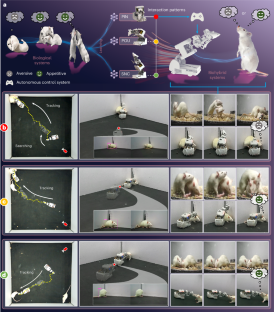通过具有习得互动模式的类鼠机器人调节老鼠的情绪状态
IF 18.8
1区 计算机科学
Q1 COMPUTER SCIENCE, ARTIFICIAL INTELLIGENCE
引用次数: 0
摘要
机器人作为社会伙伴被整合到生物系统中,在对社会行为的机械理解方面提供了有希望的进步。这些生物混合系统带来了可控性,有助于阐明以前通过传统技术无法实现的潜在生物智能。然而,最先进的交互机器人仍然难以在生物系统中传递多层次、异构的信息,这使得有效地调解复杂的交互过程具有挑战性。在这里,我们提出了一个自主的,交互式的类似老鼠的机器人,可以通过学习老鼠的解剖结构,动态运动和社会互动来与自由行为的老鼠互动。基于动物示范的模仿学习使机器人具有微妙的社会行为模板,使其能够吸引老鼠的注意并显著引起它们的兴趣。它还集成了视觉感知、目标跟踪和行为决策,大大提高了交互效率。我们证明机器人可以连续半小时与老鼠互动。此外,机器人可以通过不同的互动模式调节大鼠在机器人-大鼠社会互动中的情绪状态。这些结果证明,所提出的交互式机器人具有长期和重复的交互能力,克服了生物系统中自然社会交互的局限性。这种能够调节生物体内部状态的生物混合系统可能为理解人类与人工智能之间的“社会”互动打开了大门。本文章由计算机程序翻译,如有差异,请以英文原文为准。


Modulating emotional states of rats through a rat-like robot with learned interaction patterns
Robots, integrated into biological systems as sociable partners, offer promising advancement in the mechanistic understanding of social behaviours. These biohybrid systems bring controllability to help elucidate the underlying biological intelligence previously inaccessible through traditional techniques. However, state-of-the-art interactive robots still struggle to convey multilevel, heterogeneous information within biological systems, making it challenging to mediate the complex interaction process effectively. Here we propose an autonomous, interactive rat-like robot that can engage with freely behaving rats by learning from the anatomical structure, dynamic motions and social interaction of rats. Imitation learning based on animal demonstration enables the robot with subtle templates of social behaviour, allowing it to capture the attention of rats and significantly arouse their interest. It also integrates visual perception, target tracking and behavioural decisions to substantially augment the interaction efficiency. We demonstrate that the robot can interact with rats for a continuous half-hour. Moreover, the robot can modulate the emotional states of rats through different interaction patterns during robot–rat social interaction. These results attest that the proposed interactive robot, with its long-term and repetitive interaction capabilities, overcomes the limitations of natural social interaction within biological systems. Such biohybrid systems capable of modulating the internal states of organisms may open the door to comprehending the ‘social’ interactions between humans and artificial intelligence. Interactive robots can be used to study animal social behaviour. Imitation learning can be used to enable a rat-like robot to learn subtle templates of social behaviour, demonstrating that it can modulate the emotional states of rats through varied interaction patterns.
求助全文
通过发布文献求助,成功后即可免费获取论文全文。
去求助
来源期刊

Nature Machine Intelligence
Multiple-
CiteScore
36.90
自引率
2.10%
发文量
127
期刊介绍:
Nature Machine Intelligence is a distinguished publication that presents original research and reviews on various topics in machine learning, robotics, and AI. Our focus extends beyond these fields, exploring their profound impact on other scientific disciplines, as well as societal and industrial aspects. We recognize limitless possibilities wherein machine intelligence can augment human capabilities and knowledge in domains like scientific exploration, healthcare, medical diagnostics, and the creation of safe and sustainable cities, transportation, and agriculture. Simultaneously, we acknowledge the emergence of ethical, social, and legal concerns due to the rapid pace of advancements.
To foster interdisciplinary discussions on these far-reaching implications, Nature Machine Intelligence serves as a platform for dialogue facilitated through Comments, News Features, News & Views articles, and Correspondence. Our goal is to encourage a comprehensive examination of these subjects.
Similar to all Nature-branded journals, Nature Machine Intelligence operates under the guidance of a team of skilled editors. We adhere to a fair and rigorous peer-review process, ensuring high standards of copy-editing and production, swift publication, and editorial independence.
 求助内容:
求助内容: 应助结果提醒方式:
应助结果提醒方式:


